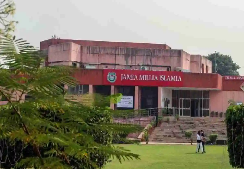Jamia Millia Islamia University (JMI) is under intense scrutiny following a report by a fact-finding committee that alleges discrimination against non-Muslims and instances of coercion for religious conversion within the institution. The report, compiled by the NGO “Call for Justice” and led by respected legal and administrative figures, paints a troubling picture of bias at the university.
Allegations of Discrimination and Harassment
The report details several accounts of discrimination and harassment targeting non-Muslim students, faculty, and staff. Witnesses claim that prejudice based on religious identity was prevalent in various aspects of university life. Some of the incidents described include:
- Discriminatory Behaviour Toward Faculty: One account described an Assistant Professor who faced taunts and insults from Muslim colleagues. Another instance involved a non-Muslim faculty member from the Scheduled Caste (SC) community who was allegedly denied basic office furniture and treated unequally compared to Muslim counterparts.
- Mockery of Non-Muslim Administrative Staff: A senior administrative official, the assistant controller of examinations, was reportedly mocked by staff for holding a high-ranking position despite being non-Muslim.
- Challenges Faced by Tribal Students and Faculty: The report also highlights the difficult environment faced by tribal students and faculty, with many students reportedly leaving the university due to the toxic atmosphere.
Coercion for Religious Conversion
Another disturbing aspect of the report is the claim that students were coerced into converting to Islam. One such incident involved a professor allegedly telling students that completing their degrees would depend on their conversion, citing personal benefits she had experienced after her own conversion.
Jamia Millia Islamia’s Official Response
In response to the allegations, Jamia Millia Islamia University issued an official statement asserting its commitment to fostering an inclusive and equitable environment. The university acknowledged that past administrations might have mishandled certain incidents but emphasized that under the current leadership of Vice-Chancellor Professor Mazhar Asif, efforts are being made to create a more inclusive atmosphere.
- Commitment to Inclusivity: The university has taken steps to involve marginalized communities in decision-making roles, including appointing non-Muslim members of the SC community to key positions.
- Zero Tolerance Policy: Professor Asif reiterated the university’s zero-tolerance stance on caste, gender, or religious discrimination.
- Response to Conversion Allegations: The university firmly denied the allegations of religious coercion, stating that there is no evidence to support the claims. They assured that any credible evidence would lead to strict action and expressed a commitment to maintaining a safe and inclusive campus for all students and staff.



